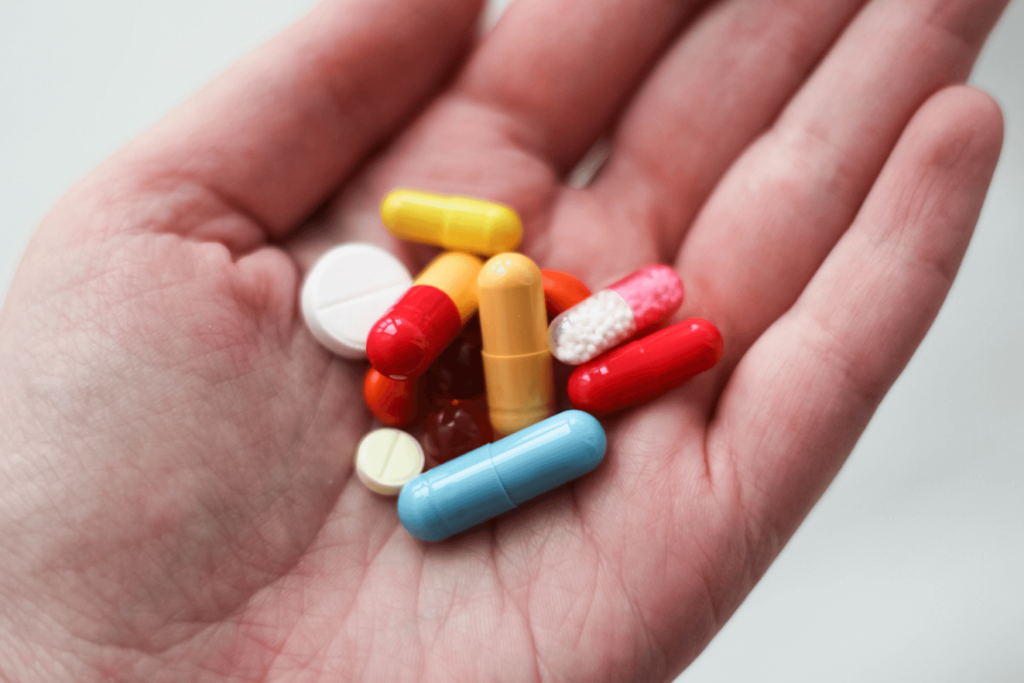Types of Antidepressants
Antidepressants are a class of drugs typically used to treat depression, but they are also used for various other medical issues. There are many different kinds of antidepressants since each person responds differently. Trying out a few before settling on one may be essential to locate the best option. Learning about your choices and having an open dialogue with your doctor can help you make the best decision.
Strong clinical evidence supports the effectiveness of prescription antidepressants, yet many people get relief from depression using over-the-counter drugs and supplements instead. Some examples are the amino acids SAMe and 5-HTP. The therapeutic efficacy of these alternatives, however, may not be proved, and they may not be regulated by the Food and Drug Administration.
We Level Up Treatment Center offers comprehensive depression medication treatment options designed to relieve its distressing symptoms.
Different Types of Antidepressants Names
Antidepressants are a class of medications designed to alleviate the symptoms of depression. They regulate neurotransmitters in the brain, which play a crucial role in mood regulation. However, not all types of antidepressants are the same, and their mechanisms of action can differ. Here, we’ll delve into the various types of antidepressants and their characteristics:
| Antidepressant Type | Examples |
|---|---|
| Selective Serotonin Reuptake Inhibitors (SSRIs) | Prozac, Zoloft, Lexapro |
| Serotonin-Norepinephrine Reuptake Inhibitors (SNRIs) | Cymbalta, Effexor, Pristiq |
| Tricyclic Antidepressants (TCAs) | Amitriptyline, Imipramine, Nortriptyline |
| Monoamine Oxidase Inhibitors (MAOIs) | Nardil, Parnate, Marplan |
| Atypical Antidepressants | Wellbutrin, Remeron, Trazodone |
What Type of Antidepressant is Wellbutrin?
Wellbutrin, also known by its generic name bupropion, is classified as an atypical antidepressant. It works differently from other common antidepressant classes like SSRIs, SNRIs, TCAs, and MAOIs. Wellbutrin primarily affects the neurotransmitters norepinephrine and dopamine in the brain and is often prescribed to help manage depression and seasonal affective disorder and to support smoking cessation. If you’re considering Wellbutrin or any antidepressant, consult a healthcare professional to determine the most suitable option for your condition.
Choosing the Right Types of Antidepressants For You
Selecting the most suitable type of antidepressant for your needs is a crucial decision that should be made in consultation with a healthcare provider. Here are some key factors to consider when choosing an antidepressant:
- Diagnosis and Symptoms: Start by discussing your symptoms with a healthcare professional. They will diagnose the type of depression or mood disorder you’re experiencing, whether it’s major depressive disorder, generalized anxiety disorder, bipolar disorder, or another condition. The specific diagnosis can guide the choice of antidepressants.
- Medical History: Inform your healthcare provider about your complete medical history, including any preexisting medical conditions and medications you take. Some medical conditions or medications may influence the choice of antidepressants due to potential interactions or side effects.
- Potential Side Effects: Different antidepressants come with different side effect profiles. Consider which side effects you can tolerate and want to avoid. For instance, weight gain, sexual side effects, or drowsiness are known side effects of certain antidepressants.
- Response to Medication: Everyone responds to antidepressants differently. Some people may find relief with one type of antidepressant, while others may not. It may take trying different medications to find the one that works best for you.
- Pregnancy and Breastfeeding: If you’re pregnant or planning to become pregnant, it’s essential to discuss the safety of antidepressants during pregnancy with your healthcare provider. Some antidepressants may pose risks during pregnancy or breastfeeding, while others are considered safer.
- Cost and Accessibility: Antidepressants can vary in cost, with some being available as generics and others as brand-name drugs. Consider your budget and insurance coverage when making your choice.
- Patient Preferences: Your preferences, such as the dosing schedule (daily, weekly), pill size, and whether you prefer a medication that can be taken with or without food, can influence your choice.
- Combination Therapy: Sometimes, a combination of antidepressants or an antidepressant paired with another type of medication, like mood stabilizers, may be more effective. Discuss these options with your healthcare provider.
- Follow-Up and Monitoring: Your healthcare provider will monitor your progress once you take an antidepressant. Be prepared for regular follow-up appointments to evaluate the medication’s effectiveness and adjust the treatment plan as needed.

Skip To:
Learn More:
- 7 Signs of High Functioning Anxiety, Symptoms & Causes. High Functioning Anxiety Treatment.
- Free Am I Depressed Quiz. Online How Depressed Am I Quiz. Take the Am I Suicidal or Depressed Quiz. Get the I Am Depressed Quiz Results. Learn Am I Depressed Or Lazy Quiz?
- Over The Counter Medicine For Anxiety And Depression
- Depression Treatment, Diagnosis, & Causes
- Atypical Antidepressants for Depression and Anxiety. Natural Antidepressants Supplements.
- Find Depression Counseling San Francisco & Mental Health Clinics in CA
- Inpatient Depression Treatment
- Severe Depression Treatment
- Residential Treatment for Depression
Get Help. Get Better. Get Your Life Back.
Searching for Accredited Drug and Alcohol Rehab Centers Near You?
Even if you have failed previously and relapsed, or are in the middle of a difficult crisis, we stand ready to support you. Our trusted behavioral health specialists will not give up on you. When you feel ready or just want someone to speak to about therapy alternatives to change your life call us. Even if we cannot assist you, we will lead you to wherever you can get support. There is no obligation. Call our hotline today.
(844) 597-1011Discover Effective Antidepression Medications at We Level Up Treatment Centers
Conquering Depression and Anxiety can feel isolating and arduous. Many individuals struggle to navigate this condition without support and frequently relapse in their efforts to manage symptoms.
View more We Level Up treatment centers.

We Level Up Fort Lauderdale
Premier Behavioral Health Treatment Center
Licensed & Accredited w/ 5-star reviews.- Inpatient mental health treatment center
- Therapy for depression, anxiety, trauma, bipolar disorder, PTSD, and more.
- Dual diagnosis rehab programs available

West Palm Beach (coming soon)
Premier Behavioral Health Treatment Center
Coming soon (licensed & accredited.)- Inpatient mental health treatment center
- Therapy for depression, anxiety, trauma, bipolar disorder, PTSD, and more.
- Dual diagnosis rehab programs available

We Level Up Washington
Premier Behavioral Health Treatment Center
Licensed & Accredited w/ 5-star reviews.- Inpatient mental health treatment center
- Therapy for depression, anxiety, trauma, bipolar disorder, PTSD, and more.
- Dual diagnosis rehab programs available
Types of Antidepressants Fact Sheet
What are Atypical Antidepressants?
Atypical antidepressants are a category of antidepressant medications that don’t fit the traditional classifications of SSRIs, SNRIs, or TCAs. They work in unique ways to relieve symptoms of depression and, in some cases, bipolar disorder.
Common Atypical Antidepressants
- Bupropion (Wellbutrin): Known for its stimulant properties and often prescribed to combat depression and help with smoking cessation.
- Mirtazapine (Remeron): Often used for its sedative properties and appetite-stimulating effects.
- Trazodone (Oleptro): Primarily prescribed to treat insomnia but may also be used to manage depression.
How Atypical Antidepressants Work
Atypical antidepressants modulate various neurotransmitters in the brain, leading to an improvement in mood and a reduction in depressive symptoms. Their mechanisms of action may include increasing norepinephrine and dopamine levels.
Atypical Antidepressants Benefits
- Lower risk of sexual side effects compared to traditional antidepressants.
- Different side effect profiles provide options for those who don’t respond well to other medications.
- It can be effective in treating depression and sometimes bipolar disorder.
Atypical Antidepressants Considerations
- Atypical antidepressants have side effect profiles, so discussing potential side effects with your healthcare provider is crucial.
- Effectiveness can vary between individuals; finding the proper medication and dosage may take time.
- Some atypical antidepressants, like bupropion, may have stimulant effects.
Common Side Effects
- Nausea.
- Dry mouth.
- Dizziness.
- Weight changes.
- Sleep disturbances.
Less Common Side Effects
- Headaches.
- Constipation.
- Sweating.
- Agitation.
- Skin reactions.
Serious Side Effects
- Allergic reactions.
- Seizures (associated with bupropion).
- Changes in mood, including anxiety and suicidal thoughts (rare).
Types of Antidepressants for Depression Statistics
One of the most prevalent mental diseases in the US is significant depression. Some people with severe depression may experience substantial impairments that impede their capacity to engage in meaningful life activities.
21 million
An estimated 21.0 million adults in the United States had at least one major depressive episode. This number represented 8.4% of all U.S. adults.
Source: National Institute on Mental Health
10.5%
The prevalence of major depressive episodes was higher among adult females (10.5%) than males (6.2%).
Source: National Institute on Mental Health
17.0%
The prevalence of adults with a major depressive episode was highest among individuals aged 18-25 (17.0%).
Source: National Institute of Mental Health

Trazodone is What Type of Antidepressant?
Trazodone is classified as an atypical antidepressant commonly used to treat depression. Atypical antidepressants like trazodone work differently from the more traditional classes of antidepressants, such as selective serotonin reuptake inhibitors (SSRIs) and tricyclic antidepressants (TCAs). Trazodone primarily affects serotonin levels in the brain by inhibiting its reuptake, which helps increase the availability of this neurotransmitter. This action is believed to contribute to its antidepressant effects.
However, trazodone is often prescribed for off-label uses as well. One of its common off-label uses is for treating insomnia due to its sedative side effects. It’s important to note that while trazodone can be effective for treating depression, it can also cause various side effects, so it should be prescribed and used under the guidance of a healthcare professional who can assess the risks and benefits for each patient. If you’re considering trazodone for any medical condition, consult your healthcare provider to discuss its appropriateness and potential side effects.
What Type of Antidepressant is Lexapro?
Lexapro, known as escitalopram, is classified as a selective serotonin reuptake inhibitor (SSRI). SSRI antidepressants are a widely used class of medications for depression and anxiety disorders. They primarily increase serotonin levels, a neurotransmitter in the brain that can help regulate mood and alleviate symptoms of depression and anxiety.
Lexapro is a specific type of SSRI commonly prescribed to manage conditions such as major depressive disorder and generalized anxiety disorder. As with any prescription medication, it’s essential to consult with a healthcare professional to determine the most suitable antidepressant for your specific condition and medical history. Your healthcare provider can guide the benefits and potential side effects of Lexapro or other antidepressants and help you make an informed decision about your treatment.

Get Your Life Back
Find Hope & Recovery. Get Safe Comfortable Detox, Addiction Rehab & Dual Diagnosis High-Quality Care.
Hotline(844) 597-1011What Type of Antidepressant is Mirtazapine?
Mirtazapine is classified as a noradrenergic and specific serotonergic antidepressant (NaSSA). It works by affecting both norepinephrine and serotonin systems in the brain.
What Type of Antidepressant is Trintellix?
Trintellix, known by its generic name vortioxetine, is categorized as an atypical antidepressant. It primarily functions as a serotonin modulator and stimulator (SMS), targeting serotonin levels and receptors in the brain.
Prozac Paxil and Zoloft Are What Type of Antidepressant Drugs?
Prozac and Zoloft belong to the class of antidepressants known as selective serotonin reuptake inhibitors (SSRIs). Paxil, on the other hand, is a selective serotonin and norepinephrine reuptake inhibitor (SSNRI). These drugs primarily influence serotonin levels in the brain to treat depression and anxiety disorders.
What Type of Antidepressant is Bupropion?
Bupropion is classified as an atypical antidepressant. It works on norepinephrine and dopamine systems in the brain. Unlike many other antidepressants, it has a unique mechanism of action.
What Type of Antidepressant is Effexor?
Effexor, or venlafaxine, is a serotonin-norepinephrine reuptake inhibitor (SNRI). It targets both serotonin and norepinephrine systems in the brain to manage symptoms of depression and anxiety.
What type of Antidepressant is Cymbalta?
Cymbalta, or duloxetine, is also classified as a serotonin-norepinephrine reuptake inhibitor (SNRI). It acts on both serotonin and norepinephrine systems in the brain to address depression, anxiety, and chronic pain conditions.
What Type of Antidepressant is Zoloft?
Zoloft, with the generic name sertraline, is a type of antidepressant classified as a Selective Serotonin Reuptake Inhibitor (SSRI). SSRIs work by increasing the levels of serotonin in the brain. Serotonin is a neurotransmitter that plays a crucial role in mood regulation. By inhibiting its reuptake, SSRIs help maintain higher levels of serotonin in the synapses between nerve cells, which can alleviate symptoms of depression and anxiety.
What Type of Antidepressant is Escitalopram?
Escitalopram, often sold under the brand name Lexapro, is another SSRI (Selective Serotonin Reuptake Inhibitor). It shares its class with Zoloft. As mentioned earlier, SSRIs like escitalopram primarily influence serotonin levels in the brain to alleviate symptoms of depression and anxiety. Lexapro is known for its high potency and relatively low risk of drug interactions compared to other SSRIs.
Each of these antidepressants has its unique characteristics, and the choice of which one to prescribe depends on the individual patient’s needs and how they respond to the medication. Consulting a healthcare provider is crucial for determining the most appropriate antidepressant for a particular person’s condition.
First-class Facilities & Amenities
World-class High-Quality Addiction & Mental Health Rehabilitation Treatment
Rehab Centers TourRenowned Addiction Centers. Serene Private Facilities. Inpatient rehab programs vary.
Addiction Helpline(844) 597-1011Proven recovery success experience, backed by a Team w/ History of:
15+
Years of Unified Experience
100s
5-Star Reviews Across Our Centers
10K
Recovery Success Stories Across Our Network
- Low Patient to Therapist Ratio
- Onsite Medical Detox Center
- Comprehensive Dual-Diagnosis Treatment
- Complimentary Family & Alumni Programs
- Coaching, Recovery & Personal Development Events
Chart Types of Antidepressants
| Antidepressant Type | Examples | Mechanism of Action |
|---|---|---|
| Selective Serotonin Reuptake Inhibitors (SSRIs) | Prozac, Zoloft, Lexapro | Increase serotonin levels in the brain |
| Serotonin-Norepinephrine Reuptake Inhibitors (SNRIs) | Cymbalta, Effexor | Affect both serotonin and norepinephrine in the brain |
| Tricyclic Antidepressants (TCAs) | Amitriptyline, Imipramine | Impact serotonin and norepinephrine levels |
| Atypical Antidepressants | Wellbutrin, Mirtazapine, Trazodone | Diverse mechanisms of action |
| Monoamine Oxidase Inhibitors (MAOIs) | Nardil, Parnate | Block the action of monoamine oxidase enzyme |
World-class, Accredited, 5-Star Reviewed, Effective Addiction & Mental Health Programs. Complete Behavioral Health Inpatient Rehab, Detox plus Co-occuring Disorders Therapy.
CALL(844) 597-1011End the Addiction Pain. End the Emotional Rollercoaster. Get Your Life Back. Start Drug, Alcohol & Dual Diagnosis Mental Health Treatment Now. Get Free No-obligation Guidance by Substance Abuse Specialists Who Understand Addiction & Mental Health Recovery & Know How to Help.
Depression Treatment Medication
The primary classes of medications used for treating Obsessive-Compulsive Disorder (OCD) are antidepressants, particularly selective serotonin reuptake inhibitors (SSRIs), and in some cases, other medications. It’s important to note that medication is usually just one part of a comprehensive treatment plan for OCD, which often includes therapy such as Cognitive Behavioral Therapy (CBT). Here are some commonly used OCD treatment medications:
- Antipsychotic Medications (used as augmenting agents):
- Aripiprazole (Abilify).
- Risperidone (Risperdal).
- Quetiapine (Seroquel).
- Anti-Anxiety Medications (for short-term relief):
- Benzodiazepines (e.g., Clonazepam, Lorazepam).
- Augmentation Agents (used in combination with antidepressants):
- Lamotrigine (Lamictal).
- Buspirone (Buspar).
- Selective Serotonin Reuptake Inhibitors (SSRIs):
- Fluoxetine (Prozac).
- Sertraline (Zoloft).
- Paroxetine (Paxil).
- Fluvoxamine (Luvox).
- Escitalopram (Lexapro).
- Citalopram (Celexa).
- Tricyclic Antidepressant:
- Clomipramine (Anafranil) – Particularly effective for OCD, though it may have more side effects than SSRIs.
- Serotonin-Norepinephrine Reuptake Inhibitors (SNRIs):
- Venlafaxine (Effexor).
- Duloxetine (Cymbalta).
- Atypical Antidepressant:
- Bupropion (Wellbutrin).
If you’re seeking professional help managing your depression, consider the specialized depression medication treatment programs available at We Level Up Treatment Center, where our experienced team is dedicated to supporting your journey of improved mental well-being.
Experience Transformative Recovery at We Level Up Treatment Centers.
See our authentic success stories. Get inspired. Get the help you deserve.
Start a New Life
Begin with a free call to an addiction & behavioral health treatment advisor. Learn more about our dual-diagnosis programs. The We Level Up Treatment Center Network delivers recovery programs that vary by each treatment facility. Call to learn more.
- Personalized Care
- Caring Accountable Staff
- World-class Amenities
- Licensed & Accredited
- Renowned w/ 100s 5-Star Reviews
We’ll Call You
Popular Types of Antidepressants FAQs
-
Is There A Best Antidepressant For Anxiety?
There isn’t a one-size-fits-all answer to this question. Different antidepressants may work differently for individuals with anxiety. Selective serotonin reuptake inhibitors (SSRIs) like sertraline (Zoloft) and escitalopram (Lexapro) are commonly prescribed for anxiety disorders due to their effectiveness. However, the choice of antidepressants depends on factors such as individual response, medical history, and potential side effects. Consulting with a healthcare professional is crucial to determine the most suitable antidepressant for anxiety.
-
What Is The Best Antidepressant For Energy And Motivation
Antidepressants affect individuals differently, and their impact on energy and motivation can vary. Some antidepressants, such as bupropion (Wellbutrin), have energizing effects and may be considered for individuals experiencing fatigue or a lack of motivation.
-
What Is The Best Antidepressant To Take With Abilify?
The antidepressant to take with Abilify (aripiprazole) depends on individual circumstances and should be determined by a healthcare professional. Commonly prescribed antidepressants in combination with Abilify include SSRIs, SNRIs, and atypical antidepressants. The specific medication and dosage will be based on factors such as the individual’s condition, symptoms, and potential drug interactions.
-
Do The Most Common Antidepressants Make You Fat?
Weight changes can occur as a side effect of certain antidepressants, but it is not the case for everyone. Some antidepressants, such as mirtazapine (Remeron) and certain TCAs, are more likely to cause weight gain. Others, like bupropion (Wellbutrin), may be weight-neutral or associated with weight loss. It’s important to discuss any concerns about weight changes with a healthcare professional, as they can provide personalized guidance and consider alternative medications if necessary.
-
Are Antidepressant Drugs Dangerous?
Antidepressant drugs, like any medication, have potential risks and side effects. However, when prescribed and used appropriately under the guidance of a healthcare professional, the benefits of antidepressants generally outweigh the risks. It’s important to closely monitor their usage, especially during the initial stages of treatment, and communicate any concerning side effects or changes in mood to a healthcare provider. Working collaboratively with a healthcare professional helps ensure the safe and effective use of antidepressant medications.
Tips for Maintaining Your Mental Well-being Informative Video
Video Script
We at We Level Up are dedicated to delivering personalized mental health services that cater to the unique needs of each individual. Our team of highly skilled professionals acknowledges that the path to mental well-being varies for each person. As a result, we work closely with our clients to create therapy programs that target their specific challenges and align with their objectives.
We strongly emphasize empathy and comprehension, providing unwavering support and guidance throughout the therapeutic journey. We strongly believe in empowering individuals to actively participate in their mental health by equipping them with the necessary tools and strategies to navigate their circumstances. We foster a secure, nurturing environment that encourages exploration, self-discovery, and personal growth.
Central to our approach is the recognition that every individual is unique, meaning their therapeutic requirements will differ. We actively listen to our clients, understanding their concerns, strengths, and aspirations. This enables us to develop tailored therapy plans that address their specific challenges while considering their distinct circumstances and preferences.
Search We Level Up Types of Antidepressants, How to Select What’s Right for You & Recovery Resources
Sources
- National Alliance on Mental Illness (NAMI) – Depression: https://www.nami.org/About-Mental-Illness/Mental-Health-Conditions/Depression Learn: types of antidepressant medication, bupropion type of antidepressant
- MedlinePlus – Depression: https://medlineplus.gov/depression.html Types of Antidepressants
- Office on Women’s Health – Depression: https://www.womenshealth.gov/mental-health/mental-health-conditions/depression trintellix type of antidepressant, Types of Antidepressants
- National Suicide Prevention Lifeline – Depression: https://suicidepreventionlifeline.org/learn/about-suicide/depression/ Types of Antidepressants
- U.S. Department of Veterans Affairs – Depression: https://www.mentalhealth.va.gov/depression.asp Types of Antidepressants
- National Institute on Aging (NIA) – Depression: https://www.nia.nih.gov/-and-older-adults Types of Antidepressants





